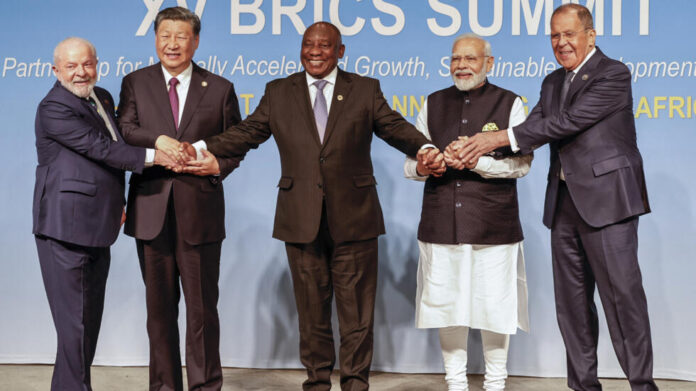On Thursday, the BRICS presidents decided to extend an invitation to six nations: Argentina, Egypt, Ethiopia, Iran, Saudi Arabia, and the United Arab Emirates.
Indian Prime Minister Narendra Modi and other BRICS leaders, including South African President Cyril Ramaphosa, Brazilian President Luiz Inacio Lula da Silva, and Chinese President Xi Jinping, made the news at a press conference during the 15th BRICS Summit. Virtual participation was made by Russian President Vladimir Putin.
The BRICS alliance, which consists of Brazil, Russia, India, China, and South Africa, has announced the addition of six additional members, marking a significant geopolitical milestone. The composition of the alliance has undergone a significant change as a result of this growth, which could alter the dynamics of international cooperation.
On August 24, South Africa’s President Cyril Ramaphosa made history by announcing the names of the new members of the BRICS alliance. South Africa served as the host country for the recent BRICS meeting. Argentina, Iran, the United Arab Emirates, Saudi Arabia, Ethiopia, and Egypt are now members of the extended BRICS. This action not only diversifies the alliance but also gives emerging economies from other areas a forum to unite their objectives on the international front. The membership of these nations will commence in January.
This growth was the outcome of careful thought rather than an unexpected turn of events. Earlier reports from official sources claimed that the BRICS was in the midst of sending invitations to prospective new members. Through this tactical strategy, it may be possible to establish relationships with countries that are eager to work together in a coalition to advance the issues of the “Global South.”
South African President Cyril Ramaphosa invited Indian Prime Minister Narendra Modi to address the gathering during the BRICS conference. In his speech, Prime Minister Modi supported the expansion plan while arguing for a “multi-polar” order that is more fair and inclusive. He also used the occasion to emphasize India’s outstanding achievements in space exploration and research, highlighting its dedication to scientific developments.
The BRICS agree on all decisions. The decision to proceed was supported by all of the BRICS members. China, though, is driving the group’s expansion. Following the February BRICS formal meeting, China’s foreign ministry declared that “Membership expansion has become part of the core agenda of BRICS.”
Iran and the West have deteriorated ties. Therefore, a strong China-Russia influence can be seen in the invitation to Iran. Furthermore, what makes the BRICS move intriguing is that Iran and Saudi Arabia, once enemies, are now associate members. China is the country that buys the most oil from Saudi Arabia. It has mediated a settlement between Tehran and Riyadh.
Saudi Arabia has historically supported the United States, which fits in perfectly with the BRICS membership.
The West can infer from Russia and Iran’s participation that the two nations still have some allies abroad.
Additionally, Egypt and Ethiopia have long-standing ties with the United States.








